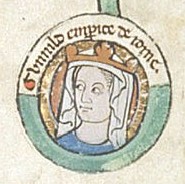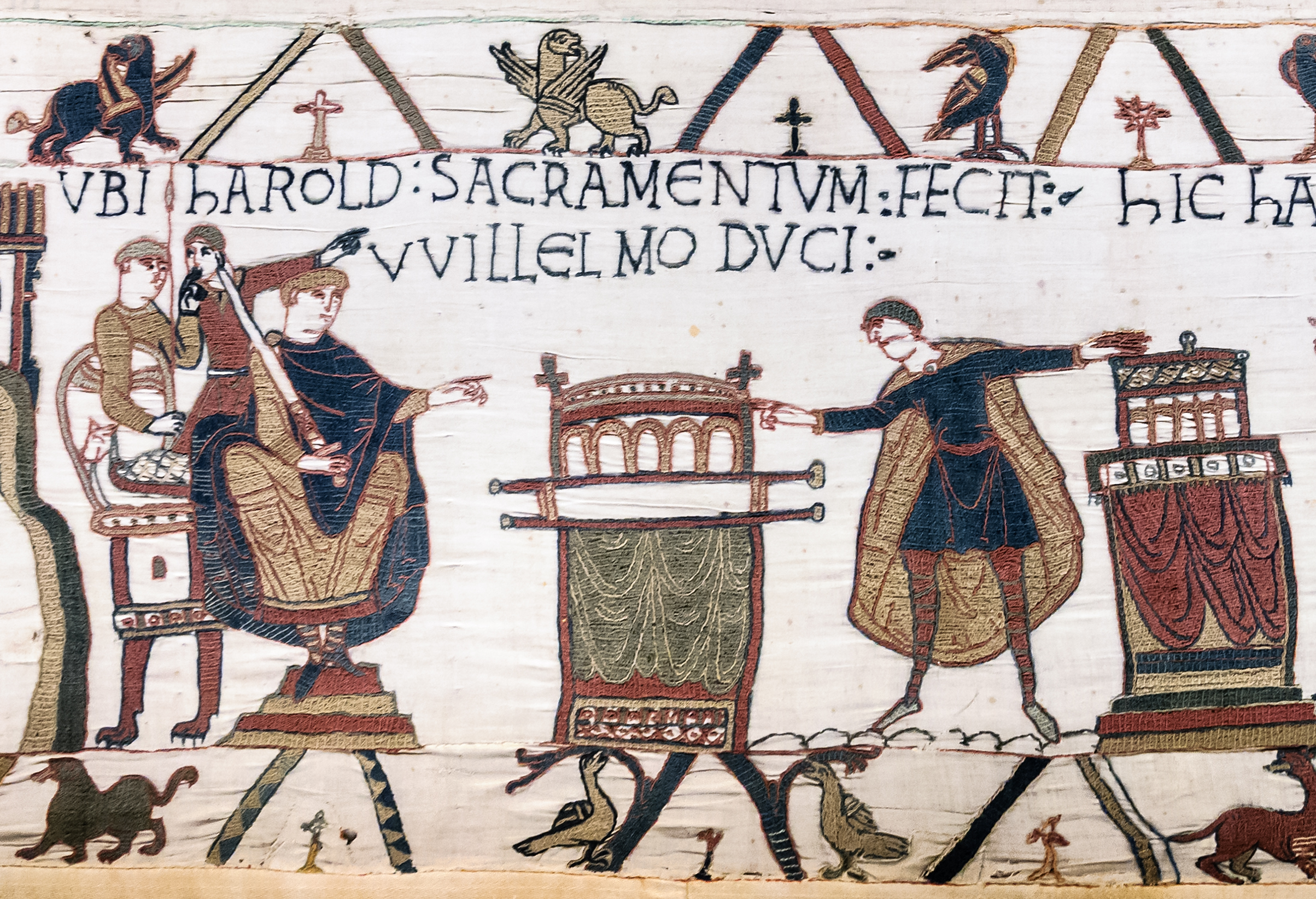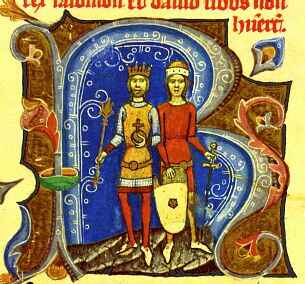|
1053
Year 1053 ( MLIII) was a common year starting on Friday of the Julian calendar. Events By place Byzantine Empire * End of the Pecheneg Revolt: Emperor Constantine IX Monomachos makes peace with the Pechenegs. However, Pecheneg raids do not cease; they not only damage the economy by plundering, but Constantine is also forced to buy protection or peace from them by gifts, land grants, privileges and titles. Europe * June 18 – Battle of Civitate: Norman horsemen (3,000 men), led by Humphrey of Hauteville, count of Apulia and Calabria, rout the combined forces under Pope Leo IX, in Southern Italy. The Normans destroy the allied Papal army and capture Leo, who is imprisoned (as a hostage for 8 months) in Benevento. * December – Conrad I, duke of Bavaria, is summoned to a Christmas court at Merseburg, and deposed by Emperor Henry III. He flees to King Andrew I in Hungary, and joins a coalition with the rebellious Welf III, duke of Carinthia. Henry's ... [...More Info...] [...Related Items...] OR: [Wikipedia] [Google] [Baidu] |
Battle Of Civitate
The Battle of Civitate was fought on 18 June 1053 in southern Italy, between the Normans, led by the Count of Apulia Humphrey of Hauteville, and a Swabian-Italian- Lombard army, organised by Pope Leo IX and led on the battlefield by Gerard, Duke of Lorraine, and Rudolf, Prince of Benevento. The Norman victory over the allied papal army marked the climax of a conflict between the Norman mercenaries who came to southern Italy in the eleventh century, the de Hauteville family, and the local Lombard princes. By 1059 the Normans would create an alliance with the papacy, which included a formal recognition by Pope Nicholas II of the Norman conquest in south Italy, investing Robert Guiscard as Duke of Apulia and Calabria, and Count of Sicily. Background The arrival of the Normans in Italy The Normans had arrived in Southern Italy in 1017, in a pilgrimage to the sanctuary of St. Michael Archangel in Monte Sant'Angelo sul Gargano (Apulia). These warriors had been used to counter th ... [...More Info...] [...Related Items...] OR: [Wikipedia] [Google] [Baidu] |
Godwin, Earl Of Wessex
Godwin of Wessex (; died 15 April 1053) was an Anglo-Saxon nobleman who became one of the most powerful earls in England under the Danish king Cnut the Great (King of England from 1016 to 1035) and his successors. Cnut made Godwin the first Earl of Wessex (). Godwin was the father of King Harold II () and of Edith of Wessex, who in 1045 married King Edward the Confessor (). Rise to power Godwin's father was probably Wulfnoth Cild, who was a thegn of Sussex. His origin is unknown but 'Child' (also written Cild) is cognate with 'the Younger' or 'Junior' and is today associated with some form of inheritance. In 1009 Wulfnoth was accused of unknown crimes at a muster of Æthelred the Unready's fleet and fled with twenty ships; the ships sent to pursue him were destroyed in a storm. Godwin was probably an adherent of Æthelred's eldest son, Æthelstan, who left him an estate when he died in 1014. This estate in Compton, Sussex, had once belonged to Godwin's father. After C ... [...More Info...] [...Related Items...] OR: [Wikipedia] [Google] [Baidu] |
Henry III, Holy Roman Emperor
Henry III (, 28 October 1016 – 5 October 1056), called the Black () or the Pious, was Holy Roman Emperor from 1046 until his death in 1056. A member of the Salian dynasty, he was the eldest son of Conrad II and Gisela of Swabia. Henry was raised by his father, who made him Duke of Duchy of Bavaria, Bavaria in 1026, appointed him co-ruler in 1028 and bestowed him with the duchy of Swabia and the Kingdom of Burgundy ten years later in 1038. The emperor's death the following year ended a remarkably smooth and harmonious transition process towards Henry's sovereign rule, that was rather uncharacteristic for the Ottonian dynasty, Ottonian and Salian dynasty, Salian monarchs. Henry succeeded Conrad II as Duke of Carinthia and King of Italy and continued to pursue his father's political course on the basis of ''virtus et probitas'' (courage and honesty), which led to an unprecedented sacral exaltation of the kingship. In 1046 Henry ended the History of the papacy (1048–1257), papal s ... [...More Info...] [...Related Items...] OR: [Wikipedia] [Google] [Baidu] |
Harold Godwinson
Harold Godwinson ( – 14 October 1066), also called Harold II, was the last crowned Anglo-Saxon King of England. Harold reigned from 6 January 1066 until his death at the Battle of Hastings on 14 October 1066, the decisive battle of the Norman Conquest. He was succeeded by William the Conqueror, the victor at Hastings. Harold Godwinson was a member of the most powerful noble family in England, his father Godwin having been made Earl of Wessex by Cnut the Great. Harold, who served previously as Earl of East Anglia, was appointed to his father's earldom on Godwin's death. After his brother-in-law, King Edward the Confessor, died without an heir on 5 January 1066, the ''Witenagemot'' convened and chose Harold to succeed him; he was probably the first English monarch to be crowned in Westminster Abbey. In late September, he defeated an invasion by rival claimant Harald Hardrada of Norway in the Battle of Stamford Bridge near York before marching his army back south to meet Willi ... [...More Info...] [...Related Items...] OR: [Wikipedia] [Google] [Baidu] |
Andrew I Of Hungary
Andrew I the White or the Catholic ( or ; 1015 – before 6 December 1060) was King of Hungary from 1046 to 1060. He descended from a younger branch of the Árpád dynasty. After he spent fifteen years in exile, an extensive revolt by the pagan Hungarians enabled him to take the throne from King Peter Orseolo. He strengthened the position of Catholic Church, Catholicism in the Kingdom of Hungary and successfully defended its independence against the Holy Roman Empire. His efforts to ensure the succession of his son, Solomon, King of Hungary, Solomon, resulted in the open revolt of his brother Béla I of Hungary, Béla. Béla dethroned Andrew by force in 1060. Andrew suffered severe injuries during the fighting and died before his brother was crowned king. Early life Childhood (c. 1015–1031) Medieval sources provide Vazul#Family, two contradictory reports of the parents of Andrew and his two brothers, Levente and Béla I of Hungary, Béla. The ''Chronicle of Zagreb'' and '' ... [...More Info...] [...Related Items...] OR: [Wikipedia] [Google] [Baidu] |
Pope Leo IX
Pope Leo IX (, , 21 June 1002 – 19 April 1054), born Bruno von Egisheim-Dagsburg, was the head of the Catholic Church and ruler of the Papal States from 12 February 1049 to his death in 1054. Leo IX is considered to be one of the most historically significant popes of the Middle Ages; he was instrumental in the precipitation of the Great Schism of 1054, considered the turning point in which the Catholic and Eastern Orthodox Churches formally separated. Leo IX favoured traditional morality in his reformation of the Catholic Church. One of his first public acts was to hold the Easter synod of 1049; he joined Emperor Henry III in Saxony and accompanied him to Cologne and Aachen. He also summoned a meeting of the higher clergy in Reims in which several important reforming decrees were passed. At Mainz, he held a council at which the Italian and French as well as the German clergy were represented, and ambassadors of the Byzantine emperor were present. Here too, simony and clerical m ... [...More Info...] [...Related Items...] OR: [Wikipedia] [Google] [Baidu] |
Conrad I, Duke Of Bavaria
Conrad I ( 1020 – 5 December 1055), also known as Cuno or Kuno, was the duke of Bavaria from 1049 to 1053. He was of the Ezzonen family, his parents being Liudolf, Count of Zütphen and eldest son of Ezzo, Count Palatine of Lorraine, and Matilda. For this, he is sometimes called ''Conrad of Zutphen''. After eighteen months of vacancy since the death of Henry VII, the duchy of Bavaria was filled on 2 February 1049 by the Emperor Henry III with Cuno. Cuno was the possible successor of the childless emperor. He was not the choice of the Bavarian nobility, but was intended to draw the duchy closer to the crown. This failed, for Cuno married against the will of the emperor when he wed Judith of Schweinfurt, daughter of Otto III, Duke of Swabia. He tried to increase his power in Bavaria and was in conflict with Gebhard III, Bishop of Regensburg. Finally, he was summoned to a Christmas court at Merseburg in 1052–1053 and there deposed. He was replaced early the next year by Hen ... [...More Info...] [...Related Items...] OR: [Wikipedia] [Google] [Baidu] |
Benevento
Benevento ( ; , ; ) is a city and (municipality) of Campania, Italy, capital of the province of Benevento, northeast of Naples. It is situated on a hill above sea level at the confluence of the Calore Irpino (or Beneventano) and the Sabato (river), Sabato. In 2020, Benevento has 58,418 inhabitants. It is also the seat of a Roman Catholic Archdiocese of Benevento, Catholic archbishop. Benevento occupies the site of the ancient ''Beneventum'', originally ''Maleventum'' or even earlier ''Oscan language, Maloenton''. In the Roman Empire, imperial period, its founder was deemed to have been Diomedes after the Trojan War. Due to its artistic and cultural significance, the Santa Sofia, Benevento, Santa Sofia Church in Benevento was declared a UNESCO World Heritage Site in 2011, as part of a group of seven historic buildings inscribed as Longobards in Italy, Places of Power (568–774 A.D.). The patron saint of Benevento is Saint Bartholomew, the Apostles in the New Testament, Apost ... [...More Info...] [...Related Items...] OR: [Wikipedia] [Google] [Baidu] |
Edward The Confessor
Edward the Confessor ( 1003 – 5 January 1066) was King of England from 1042 until his death in 1066. He was the last reigning monarch of the House of Wessex. Edward was the son of Æthelred the Unready and Emma of Normandy. He succeeded Cnut the Great's son – and his own half-brother – Harthacnut. He restored the rule of the House of Wessex after the period of Danish rule since Cnut conquered England in 1016. When Edward died in 1066, he was succeeded by his wife's brother Harold Godwinson, who was defeated and killed in the same year at the Battle of Hastings by the Normans under William the Conqueror. Edward's young great-nephew Edgar Ætheling of the House of Wessex was proclaimed king after the Battle of Hastings, but was never crowned and was peacefully deposed after about eight weeks. Historians disagree about Edward's fairly long 24-year reign. His nickname reflects the traditional image of him as unworldly and pious. Confessor of the Faith, Confess ... [...More Info...] [...Related Items...] OR: [Wikipedia] [Google] [Baidu] |
Humphrey Of Hauteville
Humphrey of Hauteville (died August 1057), also nicknamed Abelard, was the third Norman Count of Apulia and Calabria, Count of Apulia. He succeeded his brother Drogo of Hauteville, Drogo. Life Humphrey was a son of Tancred of Hauteville by his first wife Muriella. Goffredo Malaterra records him as being the third son, after William Iron Arm and Drogo of Hauteville, Drogo, while Romuald Guarna records him as being the fifth, coming after Serlo I of Hauteville, Serlo, Geoffrey of Hauteville, Geoffrey, Drogo and William. Regardless, it is unlikely anyway that Humphrey was older than Serlo, as Serlo stayed in Normandy to inherit their father’s possessions, while Humphrey journeyed to Southern Italy. {{Cite web , title=ALTAVILLA, Drogone d' - Enciclopedia , url=https://www.treccani.it/enciclopedia/drogone-d-altavilla_(Dizionario-Biografico)/ , access-date=2024-10-26 , website=Treccani , language=it {{Cite web , title=ALTAVILLA, Guglielmo d', detto Braccio di Ferro - Enciclopedia , url ... [...More Info...] [...Related Items...] OR: [Wikipedia] [Google] [Baidu] |
June 18
Events Pre-1600 * 618 – Li Yuan becomes Emperor Gaozu of Tang, initiating three centuries of Tang dynasty rule over China. * 656 – Ali becomes Caliph of the Rashidun Caliphate. * 860 – Siege of Constantinople (860), Byzantine–Rus' War: A fleet of about 200 Rus' Khaganate, Rus' vessels sails into the Bosphorus and starts pillaging the suburbs of the Byzantine Empire, Byzantine capital Constantinople. *1053 – Battle of Civitate: Three thousand Normans, Norman horsemen of Humphrey of Hauteville, Count Humphrey rout the troops of Pope Leo IX. *1264 – The Parliament of Ireland meets at Castledermot in County Kildare, the first definitively known meeting of this Irish legislature. *1265 – A draft Byzantine–Venetian treaty of 1265, Byzantine–Venetian treaty is concluded between Venetian envoys and Emperor Michael VIII Palaiologos, but is not ratified by Doge Reniero Zeno. *1391 – Tokhtamysh–Timur war: Battle of the Kondurcha River: Timur ... [...More Info...] [...Related Items...] OR: [Wikipedia] [Google] [Baidu] |
Henry IV, Holy Roman Emperor
Henry IV (; 11 November 1050 – 7 August 1106) was Holy Roman Emperor from 1084 to 1105, King of Germany from 1054 to 1105, King of Italy and List of kings of Burgundy, Burgundy from 1056 to 1105, and Duke of Bavaria from 1052 to 1054. He was the son of Henry III, Holy Roman Emperor—the second monarch of the Salian dynasty—and Agnes of Poitou. After his father's death on 5 October 1056, Henry was placed under his mother's guardianship. She made grants to German aristocrats to secure their support. Unlike her late husband, she could not control the election of the popes, thus the idea of the Libertas ecclesiae, "liberty of the Church" strengthened during her rule. Taking advantage of her weakness, Archbishop Anno II of Cologne kidnapped Henry in April 1062. He administered Germany until Henry came of age in 1065. Henry endeavoured to recover the royal estates that had been lost during his minority. He employed low-ranking officials to carry out his new policies, causing disco ... [...More Info...] [...Related Items...] OR: [Wikipedia] [Google] [Baidu] |






